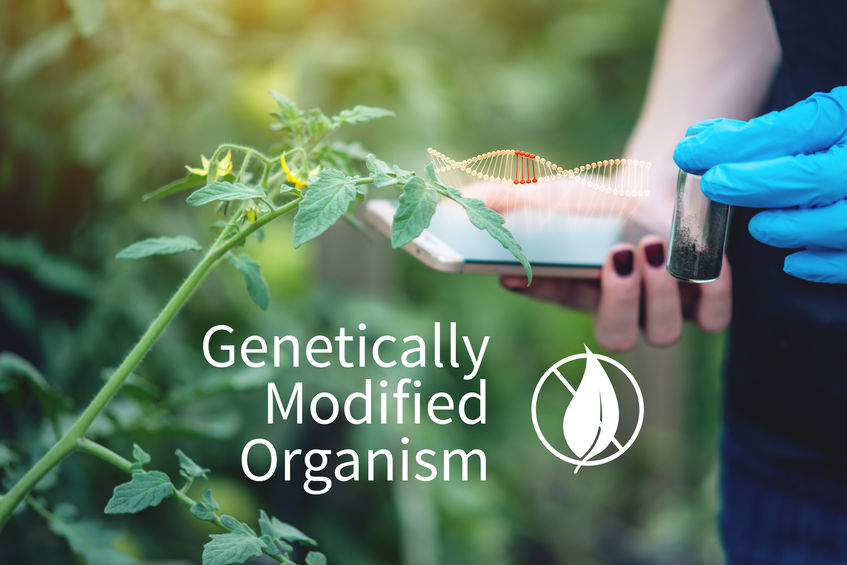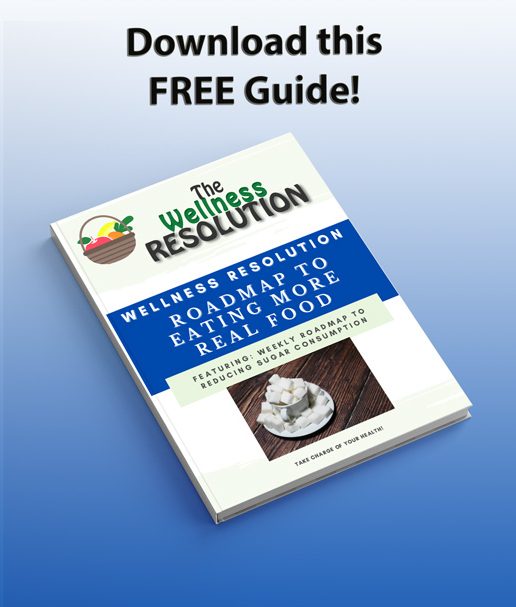What Does Non-GMO Mean? What are GMOs?
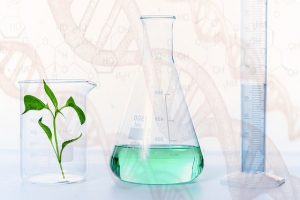 Non-GMO food is food that is not genetically modified in any way. GMO stands for Genetically Modified Organisms, it is when the genetic makeup of a plant, animal, or organism is modified in a way that is not natural.
Non-GMO food is food that is not genetically modified in any way. GMO stands for Genetically Modified Organisms, it is when the genetic makeup of a plant, animal, or organism is modified in a way that is not natural.
Approximately 80% of GMO crops across the globe are engineered to withstand herbicides. As a result, the use of toxic herbicides, such as Roundup®, has increased fifteenfold since GMOs were first introduced (Non-GMO Project). It is estimated that 70-75% of all grocery food items contain one genetically modified ingredient.
As I mentioned in my organic vs natural blog post, there are many things to consider when trying to eat more real, natural food. Eating everything organic is not always the solution. It is not always the most natural option, and may not be worth the added expenses. Avoiding GMOs is one way we can make healthier choices.
Why Are GMO’s Dangerous?
What do FDA Scientists Think?
You will definitely find sources that say there is no evidence of potential risks for consuming GMO foods. However, usually, the people who say findings are incomplete and more research is needed are biotechnology companies that are commercializing plants with GMOs. In reality, FDA scientists had repeatedly warned that GM foods can create unpredictable, hard-to-detect side effects, including allergies, toxins, new diseases, and nutritional problems (Institute for Responsible Technology). The FDA wanted to warn people, but apparently, a person from Monsanto, the largest biotech company, got in the way. In fact, we are relying on them to tell us whether GMOs are safe for us. Seems a bit wrong don’t you think?
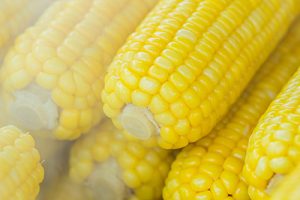
There are a lot of reports showing the dangers of the Bt toxin added to corn.
A gene from bacteria called Bt is used in corn. It has many studies showing the possibilities of problems with immune health, gut health, fertility, and liver and kidney function. In mice, studies show the Bt toxin has considerably changed their immune function. Additionally, humans had allergic reactions from exposure to a Bt spray. Bt crops are supposedly a thousand times more concentrated. In India, farmworkers are having reactions from Bt cotton. Many animals such as cows, chickens, horses, buffalo, and sheep have become severely sick from consuming Bt (GMO) products.
View these studies and more here: Studies Showing Damage (*Note: I link to a lot of different sources throughout my blog to go to for further information. This one I urge you to read if you are still unsure of the dangers of GMOs. It is packed full of studies, plus the information on the FDA’s position)
Read more about the dangers of outdoor toxins here: Outdoor Toxins – What’s in your yard?
What a Plant Biologist & Creator of GMO Plants Says
Plant Biologist, Jonathan R. Latham, PhD. at one point helped to make GMO plants, and he has a lot to say against it. Latham not only shares scientific reasons as to why GMO’s are bad, but also the flawed risk assessment, and the lack of significant purpose behind GMOs.
The purpose behind GMOs isn’t to make farming any better or to be able to feed more people. There is actually no added benefit to us. The flawed processes for risk assessment are quite fascinating, you will find protocols for safety are lacking, and some obvious red flags are ignored. This comes from Latham actually reading the government documents on risk assessment. Additionally, scientific reasoning is well explained as to the dangers. But it is all too complex for me to summarize. So, read all about Latham’s facts relating to the dangers of GMOs here: GMO Dangers: Facts You Need to Know.
Do GMOs Cause Food Sensitivities?

Food Sensitivities are more common today than ever before most likely due to genetically modified food.
As I mentioned in my blog on the dangers of consuming too much flour/wheat, food sensitivities are more common today than ever before most likely due to food being genetically modified. Plus, an increase in pesticides like glyphosate.
According to Dr. Marty Johnson, Naturopath practitioner for Total Health Nutrition Center, food that is genetically modified can produce its own pesticides in the body when it comes in contact with good bacteria in the intestines. This is the cause of leaky gut, and many people researchers and doctors alike agree that this is the reason for food allergies, brain fog, fatigue, and joint pain. Additionally, this can lead to chronic inflammation, the most common cause of most modern illnesses. Read his in-depth scientific explanation as to how the body responds to genetically modified food here: The Secret to Food Sensitivities and Healing Root Causes
Soy allergies skyrocketed by 50% in the UK, soon after GM soy was introduced (Institute for Responsible Technology).
This actually makes a lot of sense since the concept of GMO’s started around 1973, around the same time as high fructose corn syrup and variations of sugar were added to more foods. Here is the history of sugar. We are seeing the ramifications of both of these things simultaneously with people’s health deteriorating. It makes sense that the boomer generation didn’t have as many food intolerance problems growing up because the concept of GMOs didn’t actually exist then.
It is not even just the soy or corn that you need to be worried about developing a sensitivity/intolerance to though. Consuming lots of GMO food such as corn and soy can impair your digestive system. This makes it easier for you to develop food sensitivities to other foods, as well.
What are the Pros?
Some people may say there are pros to GMOs, but with all the cons I’ve mentioned, I don’t agree that there are pros to this. Reinventing food so that is more resilient against pests, insects, and stressful weather conditions have no benefit, if, in the end, they make people sick. This does not follow the concept of eating real food, which is what we need to do to stay healthy.
Not convinced GMO’s are dangerous? Here is a great book to check out: GMO Food Poison Handbook: ‘Genetically-Modified’ Agriculture and Animals. It provides a complete overview of all the dangerous health issues that can occur due to GMOs, how different parts of the body are affected, and how GMOs harm the environment. It also includes studies from well-known research scientists all across the world.
What Foods Contain GMOs?
The most common GMO plants are corn, soy, canola oil, and cotton. Some papaya, potatoes, and summer squash are genetically modified, as well. Here is the USDA List of Bioengineered food.
You might think that’s not very intimidating, but corn and soy are actually in a large majority of the foods we consume today. Soy can show up on food labels as soy, soybean oil, soy protein, soy lecithin, etc. Corn can show up on labels as high fructose corn syrup, corn syrup, corn starch, corn oil, cornmeal, etc.

A salad may not be as healthy as you think, due to GMO soy and too much sugar in the dressing.
I had to learn about the shocking amount of corn and soy in our foods the hard way – by having to avoid these things completely. This was due to the food sensitivities I had to both of these things a few years ago. I was shocked by the number of foods containing corn and soy when I started reading my food labels (Note: this was years after I had cut out high fructose corn syrup and I was still consuming too much!). It was also surprising how hard it was to avoid these foods when going out to eat.
It is almost impossible to get away from GMOs at restaurants. Soy is usually in salad dressing. Fried food or your main entree is often cooked in soybean oil, canola oil, or vegetable oil in general (which all vegetable oils are bad). Corn is common in ketchup as high fructose corn syrup, and is also added into food sauces along with soy. It can also be in soups or desserts as corn starch. Then of course there are corn chips, corn tortillas, corn on the cob, etc.
Problems with Corn, Soy, and Canola Oil
Corn
Although it is not necessary to avoid corn completely, you should know that corn has no nutritional value. So consuming a lot of corn isn’t a great idea even if it is GMO-free or organic. Plus, this could lead to food sensitivity, as corn is one of the top foods people are becoming sensitive to.
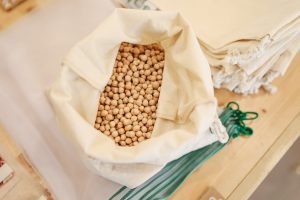 Soy
Soy
Soy is a bit tricky. Some say it has health benefits, but it also mimics estrogen. This means consuming too much could mean cancer, fertility, or thyroid problems. It is usually genetically modified, and the amount people consume today is worry some. Not to mention, it is also on the top of the list of foods people are becoming sensitive to. The top five most popular food sensitivities today are gluten, soy, corn, dairy, and eggs.
Canola Oil
Canola oil (which comes from the rapeseed plant) is also very harmful to your health. In fact, all vegetable oils are. The history is quite fascinating. I’m not going to go into detail, but vegetable oils basically started off as “toxic waste,” and then ended up labeled as heart-healthy fats. Except they are actually not good for your heart at all, they could cause heart disease (another fun marketing lie the food industry has gotten away with). Oils such as canola are linked to asthma, autoimmune disease, diabetes, obesity, infertility, memory problems i.e. Alzheimer’s disease, and more. Additionally, the trans fats that end up in the oils are connected to dementia, aggression, cardiovascular disease, and type 2 diabetes. Trans fats are bad news.
Canola oil is often used in a lot of baking recipes, oil sprays for grilling, salad dressings, and you will also find it in many chip brands among other things. Other problems with canola oil include synthetic antioxidants and too many Omega 6s. Most people consume too many Omega 6s and not enough Omega 3s. The oils can also be packed with toxic byproducts when reheated over and over again typically in restaurants when they deep-fry foods. For more details on the dangers and history view: Dr. Axe or Chris Kresser.
It doesn’t matter if the oils are not genetically modified, they are still bad news. I’ve not only read about the dangers of vegetable oils but have also heard about them from naturopath practitioners and a clinical nutritionist. It is at the top of their list of things everyone should avoid!
Nutiva Organic, Unrefined, Virgin Coconut Oil, 54 Fl Oz
A great replacement for canola oil or any vegetable oil. I find it works great in most recipes. A superfood that can help burn fat, and can even be used for skin, hair, and teeth.
How Do You Avoid GMOs?

You either need to look for food with a certified non-GMO label (compliments of the Non-GMO project) or choose organic options. Just to be clear if it says “GMO-Free” or “non-GMO,” but doesn’t have the certification logo it isn’t guaranteed. But, the concern is not only with plant food products but also with the animal foods we consume. Many animals are fed corn or soybeans, and the only way to ensure those plants are non-GMO is to choose the organic option or to choose meat products where the animals are fed their natural diet. This is something I discuss more in my blog on healthier meats and healthier fish.
If you haven’t read about the organic certification process, and what it means for a food to be labeled as organic, check out my blog on organic and natural foods.
The Non-GMO Project
The Non-GMO Project is a nonprofit organization with the goal of educating people, increasing non-GMO products, and they provide the only third-party verification in the U.S. In order for a company to possess the non-GMO label, they have to go through a certification process. A technical administer evaluates their products, facilities, and may perform testing and an on-site inspection.
NOTE: Some foods have non-GMO labeling, but are not foods typically genetically modified. This happens because some companies use it as a marketing tactic so that you will pick their food over a competitor’s foods. It is still the safer option to go with the “Non-GMO” labeled foods, but just try to focus on choosing healthier ingredients, and pay attention to labels for corn, soy, canola oil, and other GMO foods.
My Personal Tips on Making Healthy Changes
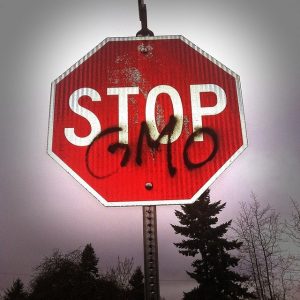 This whole GMO thing can seem rather intimidating. But we can easily make some healthier choices, and it will help our health long-term.
This whole GMO thing can seem rather intimidating. But we can easily make some healthier choices, and it will help our health long-term.
Soy and Corn
- Start reading labels on foods such as salad dressings, canned soups, condiments, snack foods like chips, and look for anything with the word “soy” in it. Look for alternatives for these foods. You might need to shop the refrigerated section for soy-free dressing or the organic aisle has some good options too. Don’t worry too much about soy lecithin which is often found in chocolates, it is usually present in small amounts and is not 100% soy.
- If you did a good job of choosing better products that are soy-free, you might have eliminated some products containing corn in the process. This is great. For corn, some of the major foods to look out for is obviously chips, other prepackaged snacks, but also baked goods, and soups. You will find it in some condiments, as well.
Canola Oil
- If you have canola oil at home, some great replacements include olive oil, coconut oil, or avocado oil. Butter and ghee are also healthier alternatives. Don’t replace your canola oil with vegetable oil though. Vegetable oils in general are very bad for your health both short-term and long-term. This might require some modifications to baking recipes, coconut oil can sometimes be used as a direct replacement. Just make sure it is in the liquid form first, by melting it.
- How to avoid canola oil in foods: I can’t recall many foods that contain canola oil other than chips, crackers, salad dressings, and other condiments. I recommend you shop in the organic aisle to find chips and other munchies without it. Canola oil might be common in prepackaged meals like pizzas or frozen dinners, or boxed cookies. So just pay attention to labels as you are purchasing your groceries each week.
Always get “extra virgin” it is the least processed olive oil. It is also important to note – many olive oils are fake there are many scandals going on in recent years. Sometimes soybean oil or sunflower oil is added to them.
Organic and Non-GMO
- Always get organic options for these foods: USDA List of Bioengineered Foods.
- If you are now eating less soy and corn, now is the time to focus on non-GMOs. If you want to consume some corn and soy, just purchase organic or non-GMO foods. That’s the best way to go for chips, popcorn, corn on the cob, and other snacks you want to enjoy once in a while.
Here is an actual research article on the dangers of GMOs: The Hazards of Genetically Engineered Foods
Download this Free Guide:
Roadmap to Eating More Real Food & Reducing Sugar Consumption
View More Healthy Eating Blogs
- 8 Tips on How to Eat Less Packaged Food (Less Junk Food)
- Over 30+ Gluten and Dairy Free Breakfast Ideas (& Sugar-Free)
- Reading and Decoding Food Labels & Toxic Ingredients
- 11 Superfoods for a Diet Higher in Nutrients
- 30 Clean Snacks and Desserts (Gluten-Free, Sugar-Free & Dairy-Free Options)
- How to Choose Healthier Dairy Products & Alternatives to Dairy
- The Truth About Milk – Why We Don’t Need it to Stay Healthy
- Guidelines & Steps to Reduce Sugar Intake
- Wild Caught vs Farm Raised Fish – What is the Difference? Which is Healthier?
- How to Choose Healthier Meats
- How to Eat Real Foods & Why It Is Essential for Your Health
- When is Organic Really Worth it?
- Organic vs. Natural: What is the difference?
- Is White Flour Bad For You? Should We Be Eating Less Carbs?
- How the Sugar Industry Tricked us for 50 Years
- Sugar Pains? Sugar – One of our Biggest Enemies!
References:
Non-GMO Project/GMO Facts. Retrieved from: https://www.nongmoproject.org/gmo-facts/
Latham PhD., Jonathon. (2019, January 7).T. COLIN CAMPBELL/GMO Dangers: Facts You Need to Know. Retrieved from: https://www.nutritionstudies.org/gmo-dangers-facts-you-need-to-know/
Institute for Responsible Technology/Studies Showing Damage. Retrieved from: https://www.responsibletechnology.org/science-guide/health-risks/
Kresser M.S., Chris. Chris Kresser/Are GMOs Safe?. (2012, November 30). Retrieved from: https://chriskresser.com/are-gmos-safe/
Kresser M.S., Chris. Chris Kresser/How Industrial Seed Oils Are Making Us Sick. (2019, February 19). Retrieved from: https://chriskresser.com/how-industrial-seed-oils-are-making-us-sick/
Dr. Axe DC, DMN, CNS, Josh. (2019, August 12). Dr. Axe/How is Canola Oil Bad for You? Plus 4 Substitutes. Retrieved from: https://draxe.com/nutrition/canola-oil-gm/
I have a Wellness Coach Certificate, I'm an entrepreneur, an innovator, writer, and artist. My expertise includes over 7 years of marketing, research, and developing content for holistic health businesses. Plus, my own personal journey of becoming chronically sick: understanding what went wrong, and finding a way to heal and live a healthier life. I have a passion for wellness with a wealth of knowledge surrounding: wellness, flaws in healthcare, root causes for chronic illnesses, and alternative treatments.

